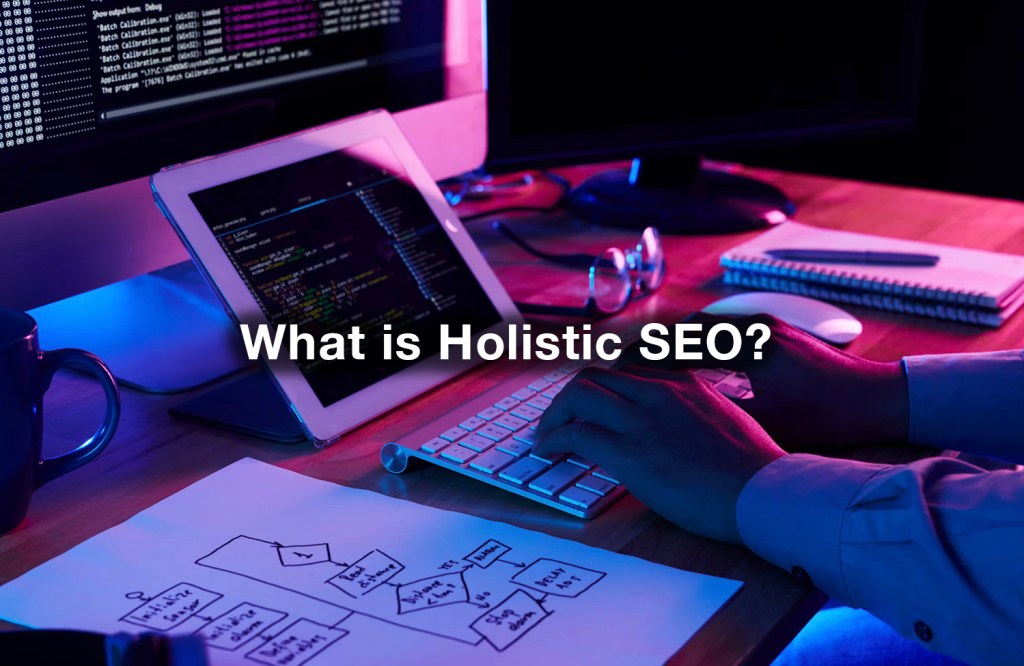Updated: Jan 02, 2024 By: Dessign Team

Holistic SEO is a mindset that goes beyond traditional search engine optimization, focusing on a comprehensive approach to ensuring a website's success. This methodology takes into account all aspects of a website and its online presence, such as content quality, user experience, and technical optimization. The ultimate goal of holistic SEO is to create a website that meets users' needs on all levels, providing the right information at the right time while also ensuring the site is easy and safe to use.
One of the main principles of holistic SEO is that it seeks long-term, sustainable success rather than relying on quick fixes or manipulative tactics. This strategy encourages webmasters to invest their time and effort in continuously improving their site and staying up-to-date with industry best practices and trends. By adopting a holistic SEO mindset, businesses can significantly increase their chances of achieving higher visibility in search engine results and, ultimately, better overall performance.
Key Takeaways
- Holistic SEO focuses on a comprehensive approach to optimizing all aspects of a website and its online presence.
- The aim is to create a high-quality, user-friendly website that meets users' needs while remaining sustainable in the long term.
- Adopting a holistic SEO mindset can increase a website's visibility in search engine results and improve overall performance.
Understanding Holistic SEO
Holistic SEO is a comprehensive approach to search engine optimization that takes into account all aspects of a website and its online presence. It goes beyond focusing on specific tactics like keyword optimization and link building. Instead, it involves a strategy that considers factors such as content quality, user experience, and technical optimization.
The holistic SEO approach emphasizes the importance of creating a website that fulfills its users' needs on all levels. This not only includes providing the right information at the right time but also ensuring that the website is easy and safe to use. As users become more sophisticated and search engines continue to evolve, adopting a holistic SEO mindset can be crucial in staying ahead of the competition.
There are several key components to a holistic SEO strategy:
- Technical SEO: This involves the optimization of a website's structure and performance, ensuring that it is easy for both users and search engines to navigate, crawl, and index the content. Website speed, mobile responsiveness, and proper URL structure are examples of elements that fall under technical SEO.
- Semantic SEO: This focuses on the meaning behind the content on a website and aims to provide users with relevant and useful information. Semantic SEO involves optimizing the content by using related keywords, structured data, and clear language that matches the user's intent.
- Local SEO: For businesses with a physical presence, local SEO is essential for attracting nearby customers. This includes optimizing business listings, incorporating location-specific content, and building local backlinks.
- Programmatic SEO: This involves automating specific SEO tasks to improve efficiency and streamline the optimization process. Examples of programmatic SEO include tools for keyword research, detecting broken links, and monitoring website performance.
- On-page and off-page SEO: On-page SEO refers to optimizing individual web pages to rank higher and attract relevant traffic, while off-page SEO involves activities that take place outside of the website to boost its search engine rankings. This might include strategies such as link-building, social media promotion, and influencer outreach.
By adopting a holistic approach to SEO, businesses can work towards creating a website that is not only optimized for search engines but also addresses the needs and preferences of its users. This can ultimately lead to improved search visibility, increased organic traffic, and enhanced user engagement.
Fundamentals of Holistic SEO
The Importance of Quality Content
Quality content plays a crucial role in Holistic SEO. High-quality content includes informative, well-researched, and engaging articles, blogs, and other types of digital content that add value to the user's experience. Search engines prioritize websites that consistently produce quality content, as they want to provide the best possible results to their users. Keep in mind that the relevance and usefulness of the content are essential factors search engines consider when ranking websites.
Significance of User Experience
User experience (UX) is an essential aspect of Holistic SEO. Search engines assess the overall user-friendliness of a website, ensuring that users can easily access the information they seek. Factors like easy navigation, clear headings, and a visually appealing layout contribute to an enhanced user experience.
Moreover, a mobile-friendly design is crucial, as it ensures that the website can adapt to different screen sizes and devices. By providing an excellent user experience, you not only improve your website's rank but also cater to your audience's needs.
Role of Speed in SEO
Site speed optimization is another critical factor in Holistic SEO. The loading time of a website significantly impacts user experience, as users tend to leave slow-loading pages in favor of faster, more responsive alternatives. Site speed also affects search engine crawlers; slow websites are less likely to be indexed, thus potentially decreasing their rank.
To optimize your website's speed, it is essential to scrutinize web page elements such as images, code, and server response times. Combining these elements with other Holistic SEO practices ensures a high-quality and competitive website in the digital age.
Key Strategies in Holistic SEO
On-Page SEO Factors
On-page SEO factors play an essential role in holistic SEO strategies, as they directly impact the content and structure of a website. Regularly optimizing elements such as title tags, meta descriptions, and headers contributes to a clear and concise message.
Keyword research and incorporation into content enables users to find relevant information quickly, thus enhancing user experience. Moreover, optimizing image size and alt attributes can improve site performance and make it more accessible to visually impaired users.
Off-Page SEO Methods
Off-page SEO methods focus on building the credibility, authority, and brand recognition of a website. An effective way to achieve this is through link building, which creates a network of high-quality backlinks from reputable sources.
These backlinks send signals to search engines like Google, indicating that a site is trustworthy and worth displaying on top of the SERP. Furthermore, engaging with social media platforms and other online communities can drive traffic and establish a brand presence among the target audience.
Technical SEO Aspects
Technical SEO aspects ensure that a website works seamlessly and is easy for search engines to crawl and index. Among the critical elements to consider are mobile-friendliness, fast load times, and proper utilization of structured data like schema markup.
Additionally, maintaining a clean site structure with well-organized URLs and sitemaps helps search engines efficiently navigate through the website's pages. Prioritizing website security is also important, as search engines favor websites with SSL certificates and secure connections.
Semantic SEO Concepts
Semantic SEO concepts involve mapping related keywords and terms to the content, allowing the site to rank for a broader range of queries in the algorithm. Utilizing latent semantic indexing (LSI) keywords and crafting content that thoroughly covers the topic can increase visibility in search results, especially when considering the competition in the search landscape.
By identifying related keywords and understanding their context within the content, it is possible to optimize for relevance, attract more organic traffic, and improve overall rankings.
Leveraging Digital Marketing In Holistic SEO
Importance of Social Media
Social media plays a crucial role in Holistic SEO, as it enables businesses to reach a wider audience and engage with potential customers. By creating and sharing high-quality content on social media platforms, businesses can increase their website traffic and improve their search engine rankings. Additionally, social media can be used for reputation management, as well as identifying popular topics and trends that can be incorporated into a holistic SEO strategy.
Finally, integrating social media efforts with SEO practices is important for tracking performance and optimizing digital marketing campaigns.
Email Marketing in SEO
Email marketing is an essential component of a Holistic SEO strategy. By building a list of subscribers and consistently sending them informative and engaging content, businesses can nurture leads and drive repeat traffic to their websites. Moreover, including relevant keywords and links to valuable content within the emails can enhance the SEO efforts.
Email marketing can also help with keeping a constant line of communication open with customers, which can improve brand awareness and credibility, resulting in better overall search rankings.
Content Marketing and Distribution
Content marketing is at the heart of Holistic SEO, as it allows businesses to attract, engage, and retain customers by offering valuable information and insights. Developing a content strategy that aligns with the target audience's interests, needs, and preferences is vital for creating content that resonates with them.
Moreover, distributing this content through various content distribution channels, such as:
- Social media: Sharing content on platforms like Facebook, Twitter, LinkedIn, and Instagram.
- Guest blogging: Writing articles on popular blogs within your industry.
- Influencer partnerships: Partnering with influencers to promote your content.
- Email marketing: Sending regular newsletters with engaging content to subscribers.
By utilizing these channels, a business can amplify its reach and improve its search engine visibility. These efforts collectively contribute towards a successful Holistic SEO strategy that aims to optimize user experience and search rankings across all digital marketing touchpoints.
Implementing A Holistic SEO Strategy
Identifying SEO Goals
Before diving into a holistic SEO strategy, it is essential to establish clear and measurable goals. These may include increasing organic traffic, boosting brand visibility, or enhancing user engagement. Determine your company's priorities and align them with the objectives of your website. Setting specific targets will help you track progress and measure the effectiveness of your strategy.
Understanding Your Target Audience
To create a well-rounded SEO strategy, it is crucial to understand your target audience. Conduct research to identify their preferences, needs, and habits, including the way they search for information online. Analyzing your customers' demographics, interests, and behaviors will enable you to optimize your web pages to cater to their expectations, ultimately improving the user experience.
Analyzing Competitor Strategies
A successful holistic SEO approach involves examining your competitors' strategies to identify their strengths and weaknesses. Conduct a thorough analysis to determine how they are attracting customers and which SEO tactics they employ. Tools like SEMrush and Ahrefs can help you uncover relevant data and insights. Based on this information, you can develop a plan to stand out among the competition and reach your target audience more effectively.
Optimizing for SERPs
Optimizing your content for search engine results pages (SERPs) plays a vital role in a holistic SEO strategy. This requires a deep understanding of on-page SEO and off-page SEO techniques, including keyword optimization, meta tags, backlinks, and website security. Ensure that your content is not only rich in information but also well-structured, mobile-friendly, and quick-loading since these factors contribute to higher rankings on SERPs.
Leveraging SEO Tools
Efficient implementation of a holistic SEO strategy involves utilizing various SEO tools to optimize your website and monitor its performance. Resources like guides, SEO courses, and online forums can help you gain in-depth knowledge and hone your skills. Integrate tools like Ahrefs, SEMrush, and Google Analytics to analyze your website, track your progress, and refine your strategies continuously.
Remember that a holistic SEO approach takes into account multiple aspects, such as technical SEO, semantic SEO, local SEO, and programmatic SEO. By focusing on these areas, you can create a comprehensive strategy that elevates your website's performance and delivers a superior user experience.
Measuring The Success of Holistic SEO
Importance of Data and Analytics
In the world of Holistic SEO, data and analytics play a crucial role in evaluating a website's overall performance. By analyzing website data, businesses can track their success, understand user behavior, and identify areas where improvements can be made.
In essence, data and analytics enable businesses to make informed decisions and implement strategies that contribute to their brand's success in the digital space.
Understanding Key SEO Metrics
Several key metrics need to be monitored when measuring the success of Holistic SEO. These include:
- Clicks: The number of times users click on a website's link from a search engine results page.
- Conversions: The number of users who complete a desired action (e.g., purchase, signup for a webinar, etc.) after visiting the website.
- Bounce rate: The percentage of users who leave the website without interacting beyond the initial landing page. A lower bounce rate indicates more engagement and a positive user experience.
- User signals: Metrics such as time spent on the website, pages viewed per session, and return visitor ratio can help gauge user experience and site quality.
- External links: The number of quality inbound links to a site, which can help build trust and authority.
These metrics, among others, can provide important insights into the effectiveness of a website's Holistic SEO approach.
Lead Generation and Acquisition
A significant goal of implementing Holistic SEO is to generate leads and drive new customer acquisition. This means that a website must be efficient and effective at converting site visitors into potential customers. Several elements contribute to successful lead generation and acquisition:
- Product presentation: Providing clear, concise, and visually appealing content that showcases a company's products and services is essential in engaging site visitors.
- Image optimization: High-quality, relevant, and visually enticing images can enhance user experience and drive further engagement.
- Brand consistency: A strong and consistent brand presence helps build trust and familiarity, making it more likely that visitors will engage with a website and its offerings.
- Language and messaging: Clear and compelling messaging encourages users to take action, such as purchasing a product or signing up for a newsletter.
By integrating these elements into a website's overall strategy, businesses can improve their lead generation and customer acquisition efforts more effectively. This, in turn, will contribute to increased revenue and overall success for the brand.
Conclusion
Holistic SEO is a comprehensive approach to search engine optimization that encompasses various aspects of a website and its online presence. This method considers factors such as content quality, user experience, and technical optimization instead of only focusing on specific tactics like keyword optimization and link building.
A website implementing holistic SEO ensures that it fulfills the needs of its users on all levels, by providing the right information at the right time and being easy and safe to use. As a result, product visibility and brand credibility are strengthened, which can lead to higher search engine rankings, increased traffic, and a growth in user engagement.
User experience plays a pivotal role in this approach, as the goal is to create a high-quality website that appeals to both users and search engines. This involves aspects such as site navigation, content structure, mobile responsiveness, and page speed optimization. A website that is easy to navigate and understand will help users find the information or products they need, resulting in a higher likelihood of satisfaction and conversion.
In conclusion, adopting a holistic SEO strategy is crucial for businesses and website owners who wish to optimize their online presence and stay competitive. By focusing on the interconnectedness of various website aspects such as user experience, content quality, and technical optimization, a holistic approach drives sustainable progress and long-term success in the ever-evolving digital landscape.
Frequently Asked Questions
What are the key components of a holistic SEO strategy?
A holistic SEO strategy focuses on optimizing all aspects of a website, including content quality, user experience, and technical optimization. This approach ensures a website's overall performance meets user needs and search engine requirements, resulting in better organic visibility. Key components include:
- Keyword research
- On-page optimization
- Off-page optimization (link building)
- Technical SEO (site speed, mobile-friendliness, etc.)
- User experience
- Quality content creation
How does semantic SEO contribute to holistic optimization?
Semantic SEO involves understanding the intent behind users' search queries and optimizing content to match that intent. By ensuring your website content is comprehensive and accurately answers users' questions using natural language, you improve both user experience and search engine results. Semantic SEO is crucial in a holistic approach since it leads to better engagement and improved visibility in search engines.
What are critical Technical SEO tasks to consider?
Technical SEO involves optimizing the website's underlying structure and code to make it more accessible to search engine crawlers. Some critical tasks include:
- Ensuring a responsive and mobile-friendly design
- Optimizing site speed and load times
- Creating a clean URL structure
- Implementing proper redirects, and handling 404 errors
- Setting up a well-structured XML sitemap
- Applying appropriate metadata, such as title tags and meta descriptions
How can image SEO be improved as part of a holistic approach?
Image SEO is essential for a holistic SEO strategy since it can improve website traffic and user experience. To improve image SEO, consider the following:
- Use relevant and descriptive filenames for images
- Optimize image size without compromising quality
- Add appropriate alt text to images for better accessibility
- Use appropriate image formats (e.g., JPEG, PNG, or WebP)
- Implement lazy loading to improve site speed
What role do copywriters play in a holistic SEO strategy?
Copywriters are essential in a holistic SEO strategy as they create high-quality, engaging, and informative content that users and search engines value. By writing content that addresses user intent and includes relevant keywords naturally, copywriters contribute to a better user experience, increase dwell time, and ultimately boost organic visibility.
What are some essential SEO resources for implementing holistic SEO?
To implement a successful holistic SEO strategy, you might consider using the following resources:
- Keyword research tools: Ahrefs, SEMrush, Google Keyword Planner
- On-page optimization and content analysis tools: Yoast, SurferSEO
- Technical SEO tools: Google Search Console, Screaming Frog, GTmetrix
- Analytics tools: Google Analytics, Google Data Studio
In addition to these tools, staying informed through blogs, forums, and online courses from reputable SEO experts can help you continually improve your holistic SEO approach.






